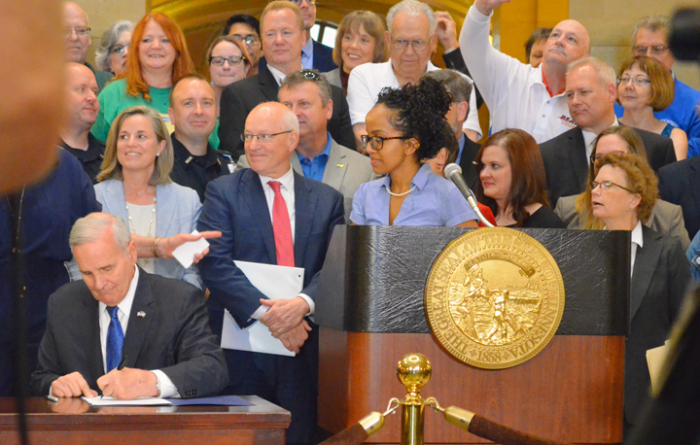

Share
Common ground between Gov. Mark Dayton and the Republican-controlled Legislature was in short supply at the Capitol this year, but lawmakers were able to compromise on two bills that union members lobbied hard for during the recently ended session.
Dayton gave final approval yesterday to a bill authorizing more than $1.4 billion in jobs-creating infrastructure investments across the state. The bonding bill will create thousands of construction jobs, Minnesota State Building and Construction Trades Council President Harry Melander said.
Today, Dayton signed a bipartisan bill to stabilize pension funds covering more than 500,000 public-sector workers, the last item of unfinished business from the 2018 session.
“This may be Gov. Dayton’s last signing of a legislative bill, but he saved the best for last,” AFSCME Council 5 Legislative Director Julie Bleyhl said.

Missed opportunities
Still, the DFL governor expressed regret that his last session before leaving office failed to make progress on issues like tax relief for working families, emergency funding for local school districts and needed investments in public transit.
Last week Dayton vetoed a tax bill and massive “omnibus” budget bill. The governor, who made his opposition to both bills known throughout the legislative process, chided Republican leaders for forging ahead on their own rather than engaging in negotiations.
“Never have I seen a legislative session so badly mismanaged, less transparent, and more beholden to monied special interests,” Dayton wrote in a letter accompanying the budget bill’s veto.
Union leaders shared Dayton’s disappointment.
Bill McCarthy, president of the state’s largest labor federation, the Minnesota AFL-CIO, said the tax bill was stuffed with perks for corporations and would have needlessly risked Minnesota’s fiscal stability.
“The Republican tax bill would have handed big corporations a permanent tax giveaway of at least $200 million dollars and created future budget deficits, while only paying lip service to working people and K-12 students,” McCarthy said. “Instead of directly investing in priorities that all Minnesotans agree on, Republicans in the Legislature tied these measures to special interest-backed policies and let big pharma off the hook for their role in the opioid crisis.”
Education issues weren’t prominent when the session began, but a string of deadly school shootings in other parts of the country thrust campus safety onto lawmakers’ agenda. And when districts across the state began announcing layoffs, Dayton responded with a proposal to put part of the state’s budget surplus into a one-time aid package.
Republicans wrapped both school security and their own, watered-down aid package into the budget and tax bills, which Dayton vetoed. But Denise Specht, president of Education Minnesota, refused to let legislative leaders off the hook for packing “important and popular priorities, like school safety, into a sludge of bad ideas that will create problems for schools and communities for many years.”
Some pressing issues, like home health care, never even made it into the final budget bill, despite mounting evidence that low wages and lack of benefits are contributing to a shortage of care workers in the state.
“Home care workers and our clients came to the Capitol throughout the session to make sure our elected officials understood the crisis facing families in every corner of the state,” said Dawn Burnfin of Chisolm, a member of SEIU Healthcare Minnesota. “Make no mistake, inaction means more pain, frustration and heartache for families across Minnesota.”

Finishing on a positive note
Although gridlock hampered progress on most issues, Dayton “firmly cemented his legacy as a champion for working people” with the pension and infrastructure-jobs bills he signed this week, McCarthy said.
Dayton signed the pension bill, which passed both the House and Senate without dissent, during a public ceremony at the Capitol today.
The measure requires current workers, employers and retirees to share in the sacrifice of fully funding public pensions in Minnesota over the next 30 years. It increases employee and employer contributions, reduces cost-of-living adjustments and draws some state funding, and it will immediately clear $3.4 billion in unfunded liabilities off the state’s books.
A coalition of public-sector unions, including AFSCME and Education Minnesota, supported the bill. Council 5’s Bleyhl called it a “towering achievement” that will keep the state’s pension system solvent for decades to come.
“With the signing of this bill, public workers are now assured of a secure and dignified retirement, which they’ve earned through their dedicated years of work serving the public,” she said.
The $1.4 billion bonding bill invests in college and university facilities, roads, bridges and other public projects. Dayton signed the bill despite criticizing it for being too modest.
“I am signing this bill, despite my objections, because areas throughout Minnesota need the projects and the jobs, which it will provide,” he said.
Melander said the Building Trades supported the governor’s more robust bonding proposal – “the bigger the bill, the more opportunities people have to feed their families” – but remain appreciative of the compromise measure.
“Minnesota’s Building Trades members are grateful for all of the good work that Gov. Dayton has done for the last eight years,” Melander added. “He will always be remembered as a great governor for Building Trades members.”

